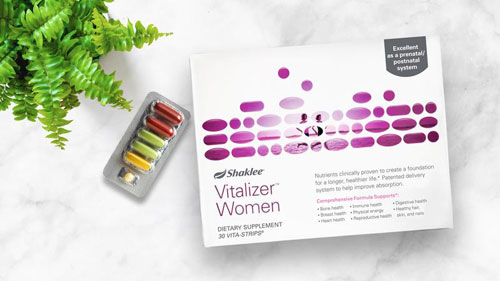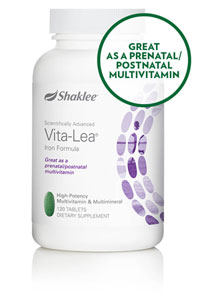 Why supplement before during and after pregnancy?
Why supplement before during and after pregnancy?
Many nutrients are essential to a healthy pregnancy and a healthy baby. So it’s important that pregnant women eat a healthy diet filled with fruits, vegetables, fiber, low fat protein and healthy fats. Because it’s difficult to get all the nutrients necessary from diet alone, many doctors recommend that women who are pregnant, planning to become pregnant, or nursing add high quality supplements to their daily regimen.
 Vitalizer® Women
Vitalizer® Women
Based on 12 clinical studies, Vitalizer Women is excellent as a prenatal/postnatal multivitamin. Each Vitalizer strip contains optimized micronutrient levels designed especially for women before, during, and after pregnancy, and while nursing.* Vitalizer Women provides a full spectrum of nutritional support:
- Vita-Lea® Advanced Multivitamin, including 800 mcg of folic acid, 200 mcg of iodine, and 18 mg of iron.†
- Caroto-E-Omega, including 500 mg of omega-3 fatty acids with 280 mg EPA and 180 mg DHA o EPA supports the heart and immune system, while DHA plays an important role in the fetal development of the brain, eyes, and central nervous system.*
- B+C Complex for energy and immune support
- Optiflora Probiotic to support healthy digestion
 Vita-Lea Iron®
Vita-Lea Iron®
Vital-Lea® Iron is great as a prenatal/postnatal multivitamin.
- Backed by 7 clinical studies
- Contains 800 mcg of folic acid, 200 mcg of iodine, and 18 mg of iron for prenatal/ postnatal support.†
Get more information on Healthy Pregnancy Solutions from Shaklee.
†Because Vitalizer Women and Vita-Lea Iron may be used by all women, additional iron above the recommended Daily Value of 18 mg was not added to these products since many women may be iron sensitive. For those women who may be iron deficient, they should consider taking Shaklee Iron Plus C supplement for additional, enhanced absorption iron for their prenatal/postnatal needs.
*These statements have not been evaluated by the Food and Drug Administration. These products are not intended to diagnose, treat, cure, or prevent any disease.
Here are 8 things to know about nutrition before and during pregnancy:
- Get a head start. Even before becoming pregnant, a woman’s nutrition, weight and general fitness can impact both her fertility as well as the health of future pregnancies. If you’re trying to conceive, it’s important to eat a healthy diet filled with fruits, vegetables, fiber, lean protein and healthy fats. In addition, specific nutrients like antioxidants such as vitamins C, E and selenium can help protect the cells in the reproductive system from oxidative stress.
- One of the most important nutrients during pregnancy is folate, also known as folic acid. Supplementing daily before and during early pregnancy with 400 to 800 mcg of folic acid can significantly reduce the incidence of neural tube defects in the baby. Folate and vitamin B12 are required for the health of the neurocognitive and cardiovascular systems. Because half of all pregnancies are, in fact, unplanned it’s important for all women of childbearing age to take a multivitamin with at least 400 to 800 mcg of folic acid every day, even if they aren’t planning a pregnancy any time soon.
- Get your vitamin A. Vitamin A is essential for immune function, as well as reproductive and fetal health. Experts recommend between 2500 to 8000 International Units per day. Experts recommend between 2500 to 8000 International Units per day.
- Vitamin D is key. Supplemental vitamin D is often required to correct deficiencies. Vitamin D plays multiple roles: it supports a healthy pregnancy, supports brain development and of course, increases the absorption of calcium. Also, if the mother has a vitamin D deficiency, there will be very low vitamin D in her breast milk, so that vitamin D supplement will continue to be important for breastfeeding.
- High quality protein and healthy fats are vital to your diet. As your body builds another human, the need for protein increases, so it’s important to get plenty of high quality lean protein. Good sources are soy, egg whites, lean meat and milk. Pregnant women should also focus on healthy fats, especially the Omega-3 fatty acids EPA and DHA. EPA supports the heart and immune system, while DHA plays an incredibly important role in the development of the brain, eyes, and central nervous system.
- Minerals make a difference. Iron is important during pregnancy because it’s essential for the creation of hemoglobin and myoglobin, two proteins that help carry oxygen to the baby. And a recent study found that supplementing with iron and folic acid has a strong protective effect in life. During pregnancy, minerals such as calcium, zinc and magnesium not only help to build baby’s healthy bones and teeth, but also help to protect the mother’s bone density.
- Iodine is imperative. During pregnancy and lactation, there’s an increased need for iodine, an essential trace mineral needed to produce thyroid hormones throughout life. During pregnancy, sufficient iodine consumption by mom is important for baby’s mental and physical health. Experts recommend 200 micrograms of supplemental iodine.
- Get the extra healthy calories you need. Pregnant and lactating women need about an extra 300 calories daily, so try to increase your nutritional intake without adding too many calories. This means making good food choices, such as minimizing fast food consumption, and making sure your daily diet has a balanced amount of proteins, carbohydrates and fat, in addition to the micronutrients.
Quality nutrition is essential throughout our lives, but there’s no better time for women to develop those healthy habits than during their childbearing years. By taking care of yourself, you’re also helping to give your baby the best possible start in life. Supplements should be an important part of your strategy to accomplish that goal.
Interested in more information on the Shaklee Opportunity, CLICK HERE